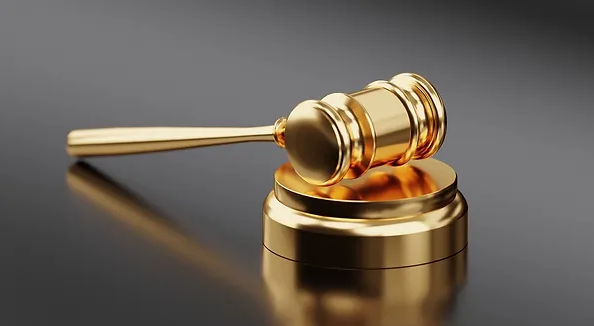GOLD FROM SLAG
“Just a victim of circumstances.”
”They had every right.”
”You would have done the same thing.”
”Who are you to judge me?”
Accountability and Authority are two topics that lie at the root of many of the circumstances and events we see playing out in much of our modern life, but they hardly seem to be addressed directly. Instead, we often skip right over them and argue from a position which seems to ignore these elements. If I think of accountability and authority as the two rails on a train track then it’s easy to imagine with them both in alignment I’m heading on the right track, but if I remove one or both of them the train derails.
In today’s worldview, the ideas of moral absolutes and absolute truth have become detestable whenever they run smack into the face of someone’s opinion or feelings. Some people have even begun to label these kinds of discussions as “hate speech.” But for those who hate the truth, the truth can sound like hate.
True hate comes from a desire to harm or destroy. When discussions around things like morality, liberty and justice come up they are not intended for destruction but rather to discuss their scope and application. Accountability and authority lie at the very heart of topics like morality, liberty and justice. None of these principles are evil in their presence, only their absence leads to destruction and derailment in my life. To ensure their presence I must have both a healthy understanding and proper application of accountability and authority.
For years of my young adult life, I traveled much of the world and was part of many of the battles being waged both physically and emotionally among clashing world-views. One of the first lessons I learned about opposing sides is that they are both equally convinced in the righteousness of their cause. Which begs the question, who is right?
When speaking about the two opposing sides during the American Civil War, Abraham Lincoln said, “In great contests each party claims to act in accordance with the will of God. Both may be, and one must be wrong. God cannot be for and against the same thing at the same time.”
In today’s more “accommodating” views people often believe that there is no God and that everyone is ultimately right In their own way. It is the same mentality that worries more about giving participation awards to ensure everyone feels like a winner, rather than letting competition reward the winner for their effort and inspire the loser to work harder toward a future victory.
While the underlying motive of this view is derived from a desire to see everyone coexist in perfect harmony and understanding, once put into practice it leads to divisive concepts around which no peaceful consensus can be reached. Simply put, if everyone’s opinions are right then how do we resolve when people do not agree? Without reward what’s the incentive of growing and learning; likewise if we are already winners what’s left aspire to?
Accountability
Today’s view on accountability is often one of constant assignment, but rarely one of acceptance. People have no problem pointing blame at others who may very well be at fault for something, but when it comes to taking full accountability for one’s own actions the argument quickly turns into one of justification. It seems there’s always an acceptable reason why I did something, but there are no excuses for others.
Interestingly enough, many of the same voices that preach about total acceptance and equality for all, will often be the same voices which point out the wrongdoings and evil actions of others. Worse, it even becomes a moral crusade for some when they even include people in the same demographics as those who committed wrongdoings, regardless if that individual had anything to do with the infraction, and they demanded recompense. Yet if the accusers commit an infraction in the process, they argue their own actions are completely justified, even if they are immoral or illegal. They feel they’re justified because they are “obviously” on the side of truth and righteousness, at least according to their view. This contradicts the message that there’s room for everyone’s views and total acceptance, yet the accuser still claims the moral high ground because they believe themselves to hold a status of victimization.
Accountability itself boils down to an argument of justice. Justice is something every human instinctively desires in our own life. Very rarely though, do I want to be on the receiving end of what justice would look like against my actions towards others.
The problem is, for justice to be true justice it must equally apply to everyone. When one side demands retribution for wrongs but feels they’re not accountable for their own actions, rather than justice we get entitlement. This creates a “victim” mentality which I will discuss more in a moment.
Authority
Some of the most empowering or belittling arguments of today revolve around the question of authority.
I could dive much deeper into this concept but I need to have at least a fundamental base to work from for this article. So, to summarize areas of authority as it pertains to this discussion I’ll address three levels or categories of authority.
The first category is feeling powerless.
When I believe I have no authority of any kind in the various areas of my life emotions like fear, helplessness, resentment or anger might drive me to live this out in various ways. I may seclude, or retreat in the hopes of being rescued; or from just trying to avoid making matters worse. I might also feel obligated to perform in a manner pleasing to whomever I feel subject to, making it hard to feel like I hold any accountability for my actions. Eventually, I may decide to rebel entirely and lash out in every possible way to gain control.
The bottom line when I feel I hold no authority and am completely subject to another, it’s very difficult to see any possible change in my circumstances. It’s also difficult to feel any personal accountability because the one I feel accountable to is the very one against whom I am rebelling. Either I am only accountable to the tyrannical rule of another, or I’m not accountable for the actions I feel obligated to perform to liberate myself.
We can see examples of this play out in a teenager rebelling against a restriction they no longer feel is appropriate for their age. A more historical reference might be the 1920’s and 1930’s in Germany. Things were so bad that when the nazi party came along and offered a means to place blame on outcasts and minorities, especially Jewish people, and gain control over the government. The “justification” was the hope of a better future for the majority of the country. It around us today looking back goes evil men like Hitler could be voted into power, but it’s because the country viewed Nazis as saviors from their circumstances.
The second category would be total authority.
In this case, I am not answerable or accountable to anyone other than myself. I believe I have the power, not just of choice, but to enforce my will. Since I alone bear the full measure of both my actions and the consequences, I ultimately do what I want, when I want, to whom I want. The scary part is this category acknowledges the very real truth that the power of choice and action truly is something I have complete control over as an individual.
However, without accountability, this quickly turns into a position of totalitarianism. In which case the choices are often designed to enforce what I choose is best for everyone under my authority, and those who are subject to my authority simply have no say. The belief is often that subjects simply don’t know what’s best for their own good, and infringing on the rights of a few is justifiable since it is by my own authority and accountability as the ruler that my actions will be measured, and it is in the interest of myself and those I chose under my authority.
This can be seen in governments designed for the “common good” while denying individual liberty, or who maintain control by using the full force of authority. It can also be seen in a parent who is refusing to allow any freedoms to their child at all as they grow. Eventually, the child will mature and simply must take full authority and accountability for themself. Denying them any freedom to grow will lead to rebellion and/or harm the child’s ability to take control over their own life.
The final category of authority could be understood as surrenderable authority.
In this concept, I recognize, I and I alone, have complete control over my own choices and actions. However, I choose to subject myself to another authority in order to create a healthy measure of accountability and to build trust within a relationship with the other authority. This means I take full authority and accountability for every choice and action I make, but recognize that I am also under the authority and accountability of another.
This might be seen in the form of a government that rules over a nation, but the government is still answerable to the people of the nation over whom it rules. It can also be seen when a parent allows a new measure of freedom to a teenager, but the teenager knows they will be answerable for their actions to the parent.
This third kind of authority, where the power of choice and action is retained by the individual, but the individual realizes they will be accountable to other authorities for their actions is the only form of relationship where true liberty and justice can be equally applied to everyone.
DEFINED OR REFINED
The phrase “you can let your past define you, or refine you“ is very true, but how can I better understand the full application of this statement? By applying both accountability and authority.
If I am not accountable for my actions, then nothing I do could ever truly be a mistake since it was done with my own best intentions. If I never make a mistake, what is there left for me to learn? This mentality simply means I will always be the victim of every circumstance with no hope of making better choices in the future. By removing all blame from myself, by default I also surrender the authority and ability to learn, grow and adapt.
If the only authority I answer to is myself, then every action I make is by default justified since I thought it was the right choice when I made it, and I am the standard by which it is measured. At which point there is nothing I can do that actually is bad or wrong. If there is no wrong, what incentive do we have to change? Leaving me to again become a victim unable to create a better future. After all, I did the right thing by my own standards. It was everyone and everything else that failed me, and how do I then change everyone else… short of tyranny?
If justice does not apply to everyone equally then it is not justice, but everyone instinctively knows justice is a necessity both as individuals and as a society.
Without proper accountability and appropriate levels of authority, I doom myself to a life of victim mentality. A victim is ultimately powerless to change their circumstances.
As I live out my life, the best hope I have at growing and becoming better through the circumstances I face is to accept full accountability and authority over every one of my decisions, but surrender authority and accountability over to those I should. Likewise, I must safeguard my personal authority and accountability against those who would seek to subjugate me for the sake of their complete control over my life.
To put it simply, what the world does to me is the world’s fault, but everything I do is my fault.
To be continued…
If surrenderable authority and being accountable to another is the way I can attain things like justice and liberty does that then solve this equation? Not completely.
While this might seem to be enough for a conclusion of accountability and authority it still leaves a few problems. If accountability to one another is all it takes we still have to wonder who is truly right in a dispute? How can I have confidence in any of my decisions if everything is subject to the authority of imperfect people?
Please take the time to read my follow-on to this article titled Supreme Authority.
I thank you for spending some time with me today, and I sincerely hope something in this message was beneficial for you.



